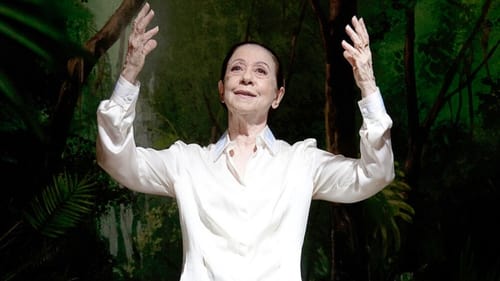
Ana Carolina
Birth : 1943-09-27, Brazil
History
Ana Carolina (born 27 September 1945) is a Brazilian film director and screenwriter. She directed seven films between 1969 and 2003.
In 1978, she was a member of the jury at the 28th Berlin International Film Festival. Her 1982 film Heart and Guts was screened in the Un Certain Regard section at the 1982 Cannes Film Festival.
Ana Carolina Teixeira Soares attended school with the intention of becoming a doctor, but instead changed direction and became a filmmaker. She graduated in 1964 from University of São Paulo Med School. Several years later she went to a School of Physiotherapy, taking special interest in university politics. She also spent a few of her early years in a Renaissance band called "Musikantiga".
She was highly focused in her early years as a filmmaker, as she made 11 documentaries in her first eight years in the business (her first being in 1967, last in 1974).
Her first film released in 1977 was titled Mar de Rosas, translated into Everything is Fine. The film is shot from a feminist perspective with interpretations open to the viewer. Mar de Rosas tells the story of a woman that slits her husband’s throat and flees with her child. It provides commentary on patriarchy and feminist discontent. This discontent is not strictly limited to the characters within the fictional landscape and speaks much more broadly to the nation at whole.
In an interview based on audacity in cinema, Carolina had much to say in regards to the censorship she faced in her time making films in Brazil. She uses words such as hysterical and neurotic to describe the impact it had on her production of films. She claims that the limitations placed on her work actually caused her to be more rebellious and this influenced her work to be even more provocative. She goes on to admit that her work in Mar de Rosas is meant to be interpreted as an allusion to the outside world. Carolina had a highly influential role as a filmmaker in one of the most restrictive times in Brazil, the Military Dictatorship (1964-1985). Her battle against censorship trail-blazed a better path to social and political commentary in film. She fought against the censorship of films, but also the censorship of ideas.
Description above from the Wikipedia article Ana Carolina (director), licensed under CC-BY-SA, full list of contributors on Wikipedia.

Director
It’s 1939, and the world is teetering on the edge. On the day World War Two breaks out, a group of people discuss the state of the world in a little bar on a South American beach, far away from the front. A Brazilian communist faces off against a Portuguese capitalist; an Argentinian fascist against a Trotskyist French actress. On this remote sandbank, they all defend their ideologies that have been overtaken by reality. Parallels with the contemporary rise of extremist ideologies in Brazil (and around the globe) are hard to ignore.

Director
On set, in the middle of the Atlantic Forest, a stressed film director begins another day of filming, reproducing the celebration of the first mass in Brazil. Suddenly three strange agents emerge from the forest and abruptly interrupt the scene. Authoritarians, they confiscate the filmed negatives. The paranoid director grumbles: "Are they from the government?". The execution of the film is compromised. Will the director in trouble be able to complete his film?

Brazilian Director Ana Carolina talks about her filmography.

Self (archive footage)
What is the future of cinema? In 1982, in Cannes, Wim Wenders invited many movie makers to answer this question. 26 years later, the question remains, but Wenders is now on the other side of the camera.

Director
The life of irreverent poet Gregório de Mattos, who lived in Bahia, Brazil, in the 17th century. Nicknamed Mouth of Hell, he used his transgressive poetry against the élite of the time.

Documentary about the film director Ana Carolina.

Writer
Fictional story based on Sarah Bernhard's visit to Brazil in 1905. The actress, experiencing a personal and professional crisis at the time, is induced by her personal Brazilian maid, Amélia, to make a performance in Rio de Janeiro. After arriving, she is forced to stand the company of Amélia's exotic sisters.

Director
Fictional story based on Sarah Bernhard's visit to Brazil in 1905. The actress, experiencing a personal and professional crisis at the time, is induced by her personal Brazilian maid, Amélia, to make a performance in Rio de Janeiro. After arriving, she is forced to stand the company of Amélia's exotic sisters.

Writer
Tereza tries to leave her past and forge her own destiny and happiness by going through several affairs.

Director
Tereza tries to leave her past and forge her own destiny and happiness by going through several affairs.

Writer
Financial problems in a religious school for girls force the government to interfere. While waiting in the conference hall to communicate the fact to the school administrators, the intervenor falls asleep and a crazy dream begins, involving teachers, students and strange characters.

Director
Financial problems in a religious school for girls force the government to interfere. While waiting in the conference hall to communicate the fact to the school administrators, the intervenor falls asleep and a crazy dream begins, involving teachers, students and strange characters.

Self
During the 1982 Cannes Film Festival, Wenders asks a number of global film directors to, one at a time, go into a hotel room, turn on the camera and answer a simple question: "What is the future of cinema?"

Documentary on famous Brazilian actresses, female directors and the role of women in Brazilian film history.

Writer
A woman runs away in the company of her daughter, the ultimate brat, in a journey full of bizarre events.

Director
A woman runs away in the company of her daughter, the ultimate brat, in a journey full of bizarre events.

Writer

Director

Producer
Documentary on one of Brazil's most controversial personalities: Getúlio Vargas, an ex-president.

Writer
Documentary on one of Brazil's most controversial personalities: Getúlio Vargas, an ex-president.

Director
Documentary on one of Brazil's most controversial personalities: Getúlio Vargas, an ex-president.

Director

Art Direction
Documentary that uses metaphors to deal with industrial development in Brazil. From the attempt to build a national industry to the almost immediate invasion of foreign capital.

Writer
Documentary that uses metaphors to deal with industrial development in Brazil. From the attempt to build a national industry to the almost immediate invasion of foreign capital.

Director
Documentary that uses metaphors to deal with industrial development in Brazil. From the attempt to build a national industry to the almost immediate invasion of foreign capital.

Writer
A debate about the agrarian reform in Brazil, in free and poetic form, showing the countrymen's struggles and hardships, and rural unionism issues after the military coup, kind of a nonlinear interpretation of Mário Chamie's poem "Lavra-Lavra".

Producer
A debate about the agrarian reform in Brazil, in free and poetic form, showing the countrymen's struggles and hardships, and rural unionism issues after the military coup, kind of a nonlinear interpretation of Mário Chamie's poem "Lavra-Lavra".

Original Music Composer
A debate about the agrarian reform in Brazil, in free and poetic form, showing the countrymen's struggles and hardships, and rural unionism issues after the military coup, kind of a nonlinear interpretation of Mário Chamie's poem "Lavra-Lavra".

Director
A debate about the agrarian reform in Brazil, in free and poetic form, showing the countrymen's struggles and hardships, and rural unionism issues after the military coup, kind of a nonlinear interpretation of Mário Chamie's poem "Lavra-Lavra".









